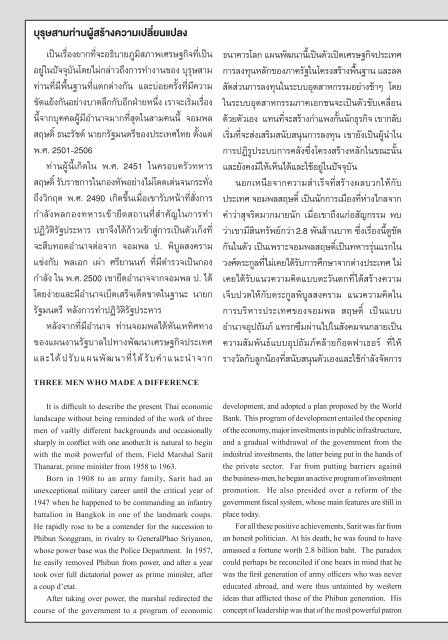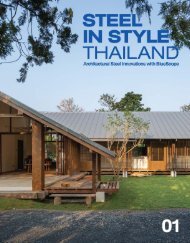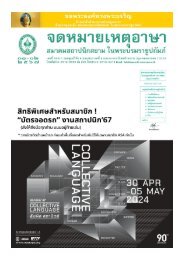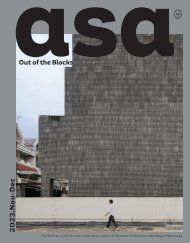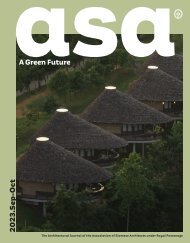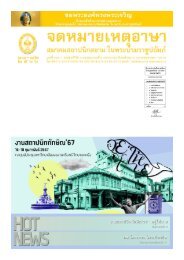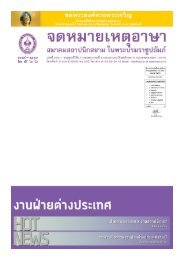บ้านเรือนถิ่นไทยในช่วงเจ็ดทศวรรษ 2489-2559
You also want an ePaper? Increase the reach of your titles
YUMPU automatically turns print PDFs into web optimized ePapers that Google loves.
บุรุษสามท่านผู้สร้างความเปลี่ยนแปลง<br />
เป็นเรื่องยากที่จะอธิบายภูมิสภาพเศรษฐกิจที่เป็น<br />
อยู่ในปัจจุบันโดยไม่กล่าวถึงการทำงานของ บุรุษสาม<br />
ท่านที่มีพื้นฐานที่แตกต่างกัน และบ่อยครั้งที่มีความ<br />
ขัดแย้งกันอย่างบาดลึกกับอีกฝ่ายหนึ่ง เราจะเริ่มเรื่อง<br />
นี้จากบุคคลผู้มีอำนาจมากที่สุดในสามคนนี้ จอมพล<br />
สฤษดิ์ ธนะรัชต์ นายกรัฐมนตรีของประเทศไทย ตั้งแต่<br />
พ.ศ. 2501-2506<br />
ท่านผู้นี้เกิดใน พ.ศ. 2451 ในครอบครัวทหาร<br />
สฤษดิ์ รับราชการในกองทัพอย่างไม่โดดเด่นจนกระทั่ง<br />
ถึงวิกฤต พ.ศ. 2490 เกิดขึ้นเมื่อเขารับหน้าที่สั่งการ<br />
กำลังพลกองทหารเข้ายึดสถานที่สำคัญในการทำ<br />
ปฏิวัติรัฐประหาร เขาจึงได้ก้าวเข้าสู่การเป็นตัวเก็งที่<br />
จะสืบทอดอำนาจต่อจาก จอมพล ป. พิบูลสงคราม<br />
แข่งกับ พลเอก เผ่า ศรียานนท์ ที่มีตำรวจเป็นกอง<br />
กำลัง ใน พ.ศ. 2500 เขายึดอำนาจจากจอมพล ป. ได้<br />
โดยง่ายและมีอำนาจเบ็ดเสร็จเด็ดขาดในฐานะ นายก<br />
รัฐมนตรี หลังการทำปฏิวัติรัฐประหาร<br />
หลังจากที่มีอำนาจ ท่านจอมพลได้หันเหทิศทาง<br />
ของแผนงานรัฐบาลไปทางพัฒนาเศรษฐกิจประเทศ<br />
และได้ปรับแผนพัฒนาที่ได้รับคำแนะนำจาก<br />
ธนาคารโลก แผนพัฒนานี้เป็นตัวเปิดเศรษฐกิจประเทศ<br />
การลงทุนหลักของภาครัฐในโครงสร้างพื้นฐาน และลด<br />
สัดส่วนการลงทุนในระบบอุตสาหกรรมอย่างช้าๆ โดย<br />
ในระบบอุตสาหกรรมภาคเอกชนจะเป็นตัวขับเคลื่อน<br />
ด้วยตัวเอง แทนที่จะสร้างกำแพงกั้นนักธุรกิจ เขากลับ<br />
เริ่มที่จะส่งเสริมสนับสนุนการลงทุน เขายังเป็นผู้นำใน<br />
การปฏิรูประบบการคลังซึ่งโครงสร้างหลักในขณะนั้น<br />
และยังคงมีให้เห็นได้และใช้อยู่ในปัจจุบัน<br />
นอกเหนือจากความสำเร็จที่สร้างผลบวกให้กับ<br />
ประเทศ จอมพลสฤษดิ์ เป็นนักการเมืองที่ห่างไกลจาก<br />
คำว่าสุจริตมากมายนัก เมื่อเขาถึงแก่อสัญกรรม พบ<br />
ว่าเขามีสินทรัพย์กว่า 2.8 พันล้านบาท ซึ่งเรื่องนี้ดูขัด<br />
กันในตัว เป็นเพราะจอมพลสฤษดิ์เป็นทหารรุ่นแรกใน<br />
วงศ์ตระกูลที่ไม่เคยได้รับการศึกษาจากต่างประเทศ ไม่<br />
เคยได้รับแนวความคิดแบบตะวันตกที่ได้สร้างความ<br />
เจ็บปวดให้กับตระกูลพิบูลสงคราม แนวความคิดใน<br />
การบริหารประเทศของจอมพล สฤษดิ์ เป็นแบบ<br />
อำนาจอุปถัมภ์ แทรกซึมผ่านไปในสังคมจนกลายเป็น<br />
ความสัมพันธ์แบบอุปถัมภ์คล้ายก๊อดฟาเธอร์ ที่ให้<br />
รางวัลกับลูกน้องที่สนับสนุนตัวเองและใช้กำลังจัดการ<br />
THREE MEN WHO MADE A DIFFERENCE<br />
It is difficult to describe the present Thai economic<br />
landscape without being reminded of the work of three<br />
men of vastly different backgrounds and occasionally<br />
sharply in conflict with one another.It is natural to begin<br />
with the most powerful of them, Field Marshal Sarit<br />
Thanarat, prime minister from 1958 to 1963.<br />
Born in 1908 to an army family, Sarit had an<br />
unexceptional military career until the critical year of<br />
1947 when he happened to be commanding an infantry<br />
battalion in Bangkok in one of the landmark coups.<br />
He rapidly rose to be a contender for the succession to<br />
Phibun Songgram, in rivalry to GeneralPhao Sriyanon,<br />
whose power base was the Police Department. In 1957,<br />
he easily removed Phibun from power, and after a year<br />
took over full dictatorial power as prime minister, after<br />
a coup d’etat.<br />
After taking over power, the marshal redirected the<br />
course of the government to a program of economic<br />
72<br />
development, and adopted a plan proposed by the World<br />
Bank. This program of development entailed the opening<br />
of the economy, major investments in public infrastructure,<br />
and a gradual withdrawal of the government from the<br />
industrial investments, the latter being put in the hands of<br />
the private sector. Far from putting barriers against<br />
the business-men, he began an active program of investment<br />
promotion. He also presided over a reform of the<br />
government fiscal system, whose main features are still in<br />
place today.<br />
For all these positive achievements, Sarit was far from<br />
an honest politician. At his death, he was found to have<br />
amassed a fortune worth 2.8 billion baht. The paradox<br />
could perhaps be reconciled if one bears in mind that he<br />
was the first generation of army officers who was never<br />
educated abroad, and were thus untainted by western<br />
ideas that afflicted those of the Phibun generation. His<br />
concept of leadership was that of the most powerful patron


